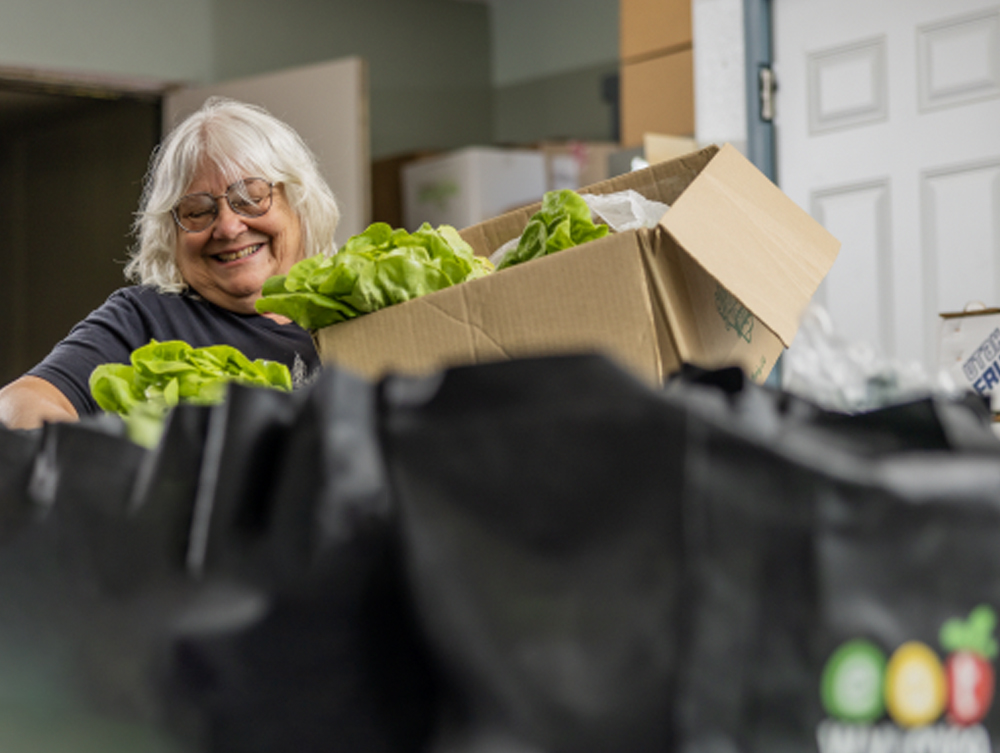THRIVING SMALL BUSINESSES IN WYOMING: Online Farmer’s Market Brings Fresh Veggies and More to Your Door
Casper entrepreneurs tap into demand for quality homegrown goods
- Published In: Other News & Features
- Last Updated: Aug 21, 2023

Pictured above is an Eat Wyoming veggie bag filled with Wyoming-grown produce. The online farmer's market, which was founded in 2018, now has 145 subscribers and works with around 65 producers, including farmers, ranchers and other small food companies. (Courtesy photo from LeAnn Miller)

By Bob Wooley
Special to the Wyoming Truth
In Wyoming, cattle is king—at least in terms of revenue from agricultural products. But that doesn’t mean there aren’t plenty of farmers in the state growing delicious, fresh fruits and vegetables, and lots of people who want to eat them.
The challenge, at least to LeAnn Miller, self-described “Veggie Lady” and local food broker for Eat Wyoming, was connecting the consumers to the growers.
Eat Wyoming, a five-year-old online farmer’s market, sells produce and meat products, including beef, chicken, sausage, pork, lamb, turkey and even yak. (Yes, yak.). The company carries breads and grains, eggs, dairy and a variety of other items like condiments, jams, pickled goodies and sweet treats, too.
But the veggies are really where the whole business idea took root.
A family affair
Miller, 67, said her son, Jesse, became interested in healthy eating as a high school wrestler. His passion for health and nutrition continued, and Jesse eventually became Dr. Jesse Miller, D.O., co-founder of Eat Wyoming, who also has a medical practice in Casper. Together, Jesse and his mother figured out how to source healthy food from Wyoming producers and get it to customers who wanted to buy local.
“We started out by doing a quick USDA grant-funded feasibility study for Natrona County,” Miller said. “We wanted to build a food hub here in Casper where we could procure products and distribute them throughout the state. And what the study showed — this was back in 2017 — was that Natrona County has a pretty good consumer base that wanted local, fresh products, but it didn’t have a lot of producers.”
After reviewing the study results, the Millers sought and secured a second USDA grant to fund another study that would examine feasibility for a business that could serve the entire state. The second study helped them to discover several pockets of productive agricultural areas across Wyoming — many of which were located in areas with populations too small to be a good market for farmers.
“That’s where we came in with our company. Getting farmers’ products to the people that wanted them… and marketing. Those were the two biggest issues,” Miller said.
Miller’s background in sales and marketing, along with her unique understanding of farm life, have helped the business maintain positive growth trends since its opening in 2018.
Putting a new spin on the traditional Community Supported Agriculture (CSA) model, Miller approached farmers with an offer to buy a specific amount of produce if they agreed to grow it. And they did. Starting with just a handful of producers, Eat Wyoming has grown exponentially and now works with around 65 producers, including farmers, ranchers and other small food companies.
The labor force has grown, too. The company now employs an office manager, three to four drivers at any time and a warehouse worker. And the Millers work with a chef to develop recipes to share with customers.
Miller describes her role as a worker bee who handles the day-to-day business, while Jesse plays more of a big picture, strategic role.

How it works
Eat Wyoming customers can purchase a variety of individual items online — curried carrot pickles and honey are customer favorites. Or they can choose one of multiple subscription options. Customers who choose the VeggieBox Leap Frog option receive 26 deliveries per year. A “VeggieBox” is actually a bag filled with farm-fresh Wyoming vegetables and seasonal fruits. Prices vary based on subscription type, but in general, the cost is around $36 per VeggieBox.
Each bag contains 15 to 20 lbs. of seven to nine different varieties of veggies. And all VeggieBox farmers use organic practices, which means no synthetic pesticides, herbicides or fertilizers. Most of the recent bags contained red cabbage, summer squash, a candy sweet onion, fennel bulbs, tomatoes, green beans, cauliflower and beets, Miller said. The selection constantly changes as farmers pick what’s ripe and ready. Subscribers also can customize their VeggieBox by adding on coffee, herbs, milk or mushrooms.
Using a refrigerated box truck, Miller or one of her drivers hits the road several times per week to pick up veggies from the farms. Everything is then brought back to the Casper hub, where it is sorted, packed and placed in another refrigerated vehicle, most likely a van, and delivered to customers.
It’s a concept that’s caught on. Miller said when they first started out, Eat Wyoming had around 10 VeggieBox subscribers. That number has grown to 145. And that doesn’t account for all of the other products they sell.
Subscriptions have grown around 30% for each of the past two years. To continue that growth trend, Eat Wyoming is moving into the wholesale market, bringing the same fresh, local produce to restaurants with sights set on offering a farm-to-table experience. Miller said there’s good opportunity in that market segment if they can get wholesale customers to understand the value of locally grown produce—even if the initial price seems a bit higher.
“In most cases, our produce was picked from the vine or pulled from the ground — in just 48 to 72 hours before we deliver it to our customers,” she said. “It’s not the same as produce that is trucked in for days, sitting in warehouses, picked when it’s not yet ripe and then sometimes ripened with gas.”
With routes in the Bighorn Basin, Cheyenne, Laramie, Fremont and Teton Counties, Eat Wyoming can serve the larger population centers. But Miller said they strive to bring that service to more rural areas as well, traveling as far as Newcastle in the northeast, and making inroads into the Rock Springs area.
Always looking to introduce new products into the lineup and expand her list of producers, Miller is eager to find some fresh favorites to add to her list of top sellers. Because even as the business has grown, the mission of expanding markets for Wyoming producers and bringing fresh Wyoming foods to customers remains the same.













